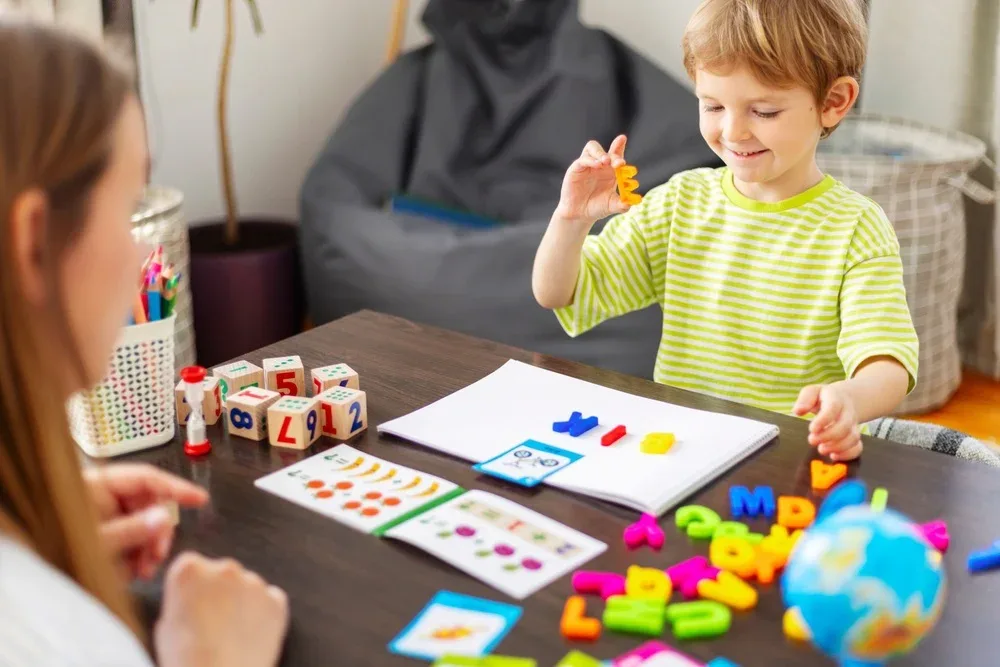
Literacy activities for preschoolers are essential in laying the groundwork for their future reading and writing skills. These activities teach kids to read and write, enhancing cognitive development, fine motor skills, and phonemic awareness. In this blog, we’ll explore 15 fun and engaging literacy activities for preschoolers you can try with your preschoolers at home or at your daycare. Let’s get started!
Contents
- 1 Alphabet Scavenger Hunt
- 2 Story Time Read Aloud
- 3 Match Game with Words and Pictures
- 4 Phonemic Awareness Activities
- 5 Letter Tracing with Paper Plates
- 6 Simple Word Spelling
- 7 Name Recognition Practice
- 8 Interactive Storytelling
- 9 Picture Books Exploration
- 10 Letter of the Week
- 11 Rhyme Time Fun
- 12 Write and Illustrate Stories
- 13 Fun with Finger Puppets
- 14 Sight Word Bingo
- 15 Fine Motor Skills Crafts
- 16 FAQs
- 17 Conclusion
Alphabet Scavenger Hunt
Nothing beats the excitement of a scavenger hunt! Hide letters of the alphabet around the classroom or house and encourage your preschoolers to find them. Once they locate a letter, have them say the letter out loud and think of a word that starts with it. This activity boosts letter recognition and vocabulary.
Story Time Read Aloud
Reading aloud is one of the simplest yet most effective literacy activities for preschoolers. Choose engaging stories and read to the children, using different voices and expressions to keep them captivated. This enhances their listening skills, comprehension, and love for reading.
Match Game with Words and Pictures
Create a match game using simple words and corresponding pictures. For instance, pair the word “cat” with a picture of a cat. This helps preschoolers connect words with their meanings, aiding vocabulary building and recognition.
Phonemic Awareness Activities
Phonemic awareness is crucial for early literacy skills. Play games that involve identifying and manipulating sounds, like clapping out the number of syllables in a word or finding words that rhyme. These activities develop the ability to hear and distinguish different sounds in words.
Letter Tracing with Paper Plates
Use paper plates to create a fun and tactile letter-tracing activity. Write a letter on each plate and have the kids trace over the letters with their fingers. This enhances their fine motor skills and helps them learn to write letters.
Simple Word Spelling
Using magnetic letters or letter blocks, encourage your preschoolers to spell simple words like “cat,” “dog,” or “hat.” This activity reinforces letter recognition, spelling skills, and phonics.
Name Recognition Practice
Create name tags for each child and encourage them to recognize and spell their names. You can also include fun activities like decorating their name tags with stickers or drawings. This promotes a personal connection to literacy and name recognition.
Interactive Storytelling
Let the kids be part of the storytelling process. Use props, puppets, or flannel boards to make the story interactive. This engages their imagination, enhances language skills, and improves their ability to sequence events.
Picture Books Exploration
Provide a variety of picture books and let the children explore them. Ask them to describe what they see in the pictures and predict what might happen next. This boosts their observational skills, vocabulary, and comprehension.
Letter of the Week
Focus on a different letter each week. Incorporate activities emphasizing that letter, such as finding objects that start with the letter, crafting the letter with playdough, or singing songs about it. This reinforces letter recognition and phonemic awareness.
Rhyme Time Fun
Play rhyming games where kids have to find words that rhyme with a given word. Use rhyming books or create rhyming flashcards to make it more interactive. Rhyming activities develop phonological awareness and are foundational for reading.
Write and Illustrate Stories
Encourage preschoolers to create their own stories. Provide them with a piece of paper on which to draw pictures and write simple sentences. This will foster creativity, narrative skills, and early writing skills.
Fun with Finger Puppets
Finger puppets are great for Storytelling and role-playing. Create or buy finger puppets and let the kids act out stories or invent their own. This boosts language development, creativity, and social skills.
Sight Word Bingo
Create bingo cards with simple sight words and play bingo. When a word is called out, the kids must find and mark it on their card. This makes learning sight words fun and engaging.
Fine Motor Skills Crafts
Incorporate crafts that involve cutting, coloring, and gluing. These activities engage children and enhance their fine motor skills, which are crucial for writing.
FAQs
Why are literacy activities important for preschoolers?
Literacy activities are crucial as they lay the foundation for reading and writing skills, enhance cognitive development, and improve language and phonemic awareness.
How often should we do literacy activities with preschoolers?
Daily practice is ideal. Integrating short, fun, and engaging literacy activities into the daily routine can significantly benefit preschoolers’ literacy development.
Can these activities be done at home and in daycare?
Absolutely! These activities are designed to be versatile and can be easily adapted for both home and daycare settings.
How can I make literacy activities more engaging for my preschooler?
Use a variety of activities that incorporate play, creativity, and interaction. Keeping sessions short and lively will also help maintain their interest.
Conclusion
Incorporating these fun and effective literacy activities into your preschooler’s daily routine can significantly impact their early childhood education. By fostering a love for reading and writing from a young age, you’re setting them up for future academic success. Remember, the key is to keep the activities engaging and interactive to hold their attention and make learning enjoyable. Happy teaching!
Visit our website Deecyda Daycare to learn more about our programs and enroll your child. Let’s make learning an exciting journey together!
For more insights and tips, check out Teaching Expertise and continue exploring innovative ways to support early literacy development.

